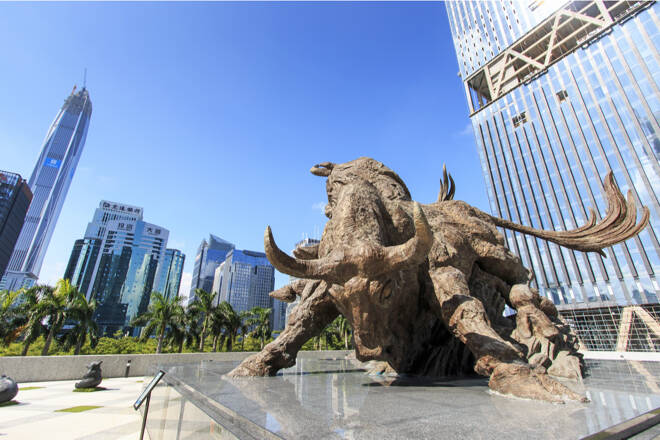Advertisement
Advertisement
Hang Seng Index, Nikkei Index, ASX 200: What’s Next for Asian Markets after 40,000?
By:
Key Points:
- The Nikkei blossomed on a testy Monday session, breaking through the 40,000 barrier for the first time.
- On Tuesday, service sector PMIs from Australia, China, and Japan warrant investor attention.
- Updates from the National People’s Congress in China also need consideration.
Overview of the Monday Session
On Monday, the Hang Seng Index and Nikkei ended the session in positive territory. Significantly, the Nikkei broke through the 40,000 barrier for the first time in history. However, ASX 200 ended the session with losses as iron ore price trends sank mining stocks.
US economic indicators from Friday set the tone for the Monday session. Softer-than-expected manufacturing and consumer confidence supported bets on a June Fed rate cut.
10-year US Treasury yields slid by 1.60%, ending the session at 4.184%. On Friday, the Nasdaq Composite Index and the S&P 500 saw gains of 1.14% and 0.80%, respectively. The Dow ended the day up 0.23%.
However, the Asian economic calendar also influenced the Monday session.
In Japan, capital expenditures surged 16.4% year-on-year in Q4, signaling a pickup in business sentiment. The hotter-than-expected numbers supported bets on an April Bank of Japan pivot from negative rates. Economists forecast capital expenditures to increase by 1.9% in Q4 after rising by 3.4% in Q3.
However, building approvals and jobs data painted a gloomy picture of the Australian economy. Building approvals unexpectedly declined by 1.0% in January, while job ads slid by 2.8% in February.
Services PMIs and the National People’s Congress
Services PMI numbers from Australia, China, and Japan will garner investor interest on Tuesday. The Caixin Services PMI will likely influence market risk sentiment more. Economists forecast the Caixin Services PMI to increase from 52.7 to 53.4.
However, investors must consider inflation numbers from Japan, which could impact bets on an April BoJ pivot from negative rates. Economists expect the Tokyo core inflation rate to accelerate from 1.6% to 2.5% in February. An inflation rate above 2% could incentivize the BoJ to consider exiting negative rates.
There were no overnight US economic data from Monday for investors to consider. Nonetheless, investors must consider the equity market movements from the Monday session.
On Monday, the Nasdaq Composite Index declined by 0.41%. The Dow and S&P 500 ended the session down 0.25% and 0.12%, respectively. Investors turned cautious before key economic data and Fed Chair Powell testimony on Wednesday and Thursday.
On Tuesday, the ASX 200 and Nikkei futures were down by 3 and 50 points, respectively.
ASX 200
The ASX 200 declined by 0.13% on Monday. Mining stocks dragged the ASX 200 into negative territory. Banking, gold, and tech stocks limited the downside. The S&P ASX All Technology Index (XTX) gained 0.29%.
Gold (XAU/USD) stocks led the way. Northern Star Resources Ltd. (NST) and Evolution Mining Ltd. rallied 6.03% and 4.39%, respectively.
For the big four banks, the Commonwealth Bank of Australia (CBA) and Westpac Banking Corp. (WBC) ended the session up 0.65% and 0.98%, respectively. ANZ Group Holdings Ltd (ANZ) and National Australia Bank Ltd. (NAB) rose by 0.21% and 0.29%, respectively.
Oil stocks had a mixed start to the week. Woodside Energy Group Ltd (WDS) declined by 1.07%, while Santos Ltd (STO) gained 0.83%.
Lower iron ore prices dragged mining stocks into negative territory. Fortescue Metals Group Ltd. (FMG) slid by 3.24%. BHP Group Ltd (BHP) and Rio Tinto Ltd. (RIO) declined by 1.54% and 1.17%, respectively.
Hang Seng Index
On Monday, the Hang Seng Index rose by 0.04%. Real estate and tech stocks pressured the Hang Seng Index. The Hang Seng Mainland Properties Index (HSMPI) and Hang Seng Tech Index (HSTECH) declined by 3.02% and 0.38%, respectively.
Alibaba (9988) and Tencent (0700) fell by 1.30% and 0.43%, respectively.
Bank stocks also had a negative session. HSBC (0005) declined by 0.90%. China Construction Bank (0939) and Industrial Commercial Bank (1398) saw losses of 0.61% and 0.74%, respectively.
The Nikkei 225
(Graph for reference purposes only)
The Nikkei gained 0.50% on Monday. Significantly. the Nikkei broke through 40,000 and held onto the 40,000 handle.
Bank stocks had a mixed start to the week. Sumitomo Mitsui Financial Group Inc. (8316) rose by 0.13%, while Mitsubishi UFJ Financial Group Inc. (8306) fell by 0.10%.
The main components of the Nikkei also had a mixed session.
Tokyo Electron Ltd. (8035) trended higher, gaining 2.37%, with Softbank Group Corp. (9948) up 0.30%.
However, Sony Group Corporation (6758) slid by 1.44%. KDDI Corp. (9433) and Fast Retailing Co. Ltd. declined by 0.51% and 0.45%, respectively.
For upcoming economic events, refer to our economic calendar.
About the Author
Bob Masonauthor
With over 28 years of experience in the financial industry, Bob has worked with various global rating agencies and multinational banks. Currently he is covering currencies, commodities, alternative asset classes and global equities, focusing mostly on European and Asian markets.
Advertisement
